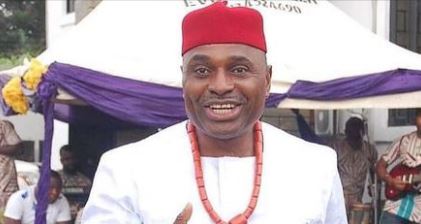The Dismissal of Kenneth Okonkwo from the Labour Party
The Labour Party (LP) has publicly disassociated itself from Kenneth Okonkwo, its former Presidential Campaign Council spokesman, declaring him no longer a member. The party’s National Secretary, Umar Farouk, confirmed this in an interview, advising Okonkwo to return to his acting career, suggesting he lacks the qualities of a successful politician. This follows Okonkwo’s public resignation statement, where he cited internal crises and the party’s perceived lack of preparedness for the 2027 general elections as reasons for his departure.
Okonkwo’s resignation statement highlighted his commitment to good governance and his belief that the LP, in its current state, could no longer serve as a vehicle for achieving that goal. He expressed his intention to seek a new political platform aligned with his values and aspirations. He set his official resignation date for February 25, 2025, the second anniversary of the 2023 presidential election, allowing him time to explore other political options. He pledged continued loyalty to the Nigerian people, promising to prioritize their interests in his future political endeavors.
Central to Okonkwo’s criticisms was the leadership of LP National Chairman, Julius Abure. He argued that Abure prioritized personal interests over the party’s well-being, particularly by hindering the efforts of a caretaker committee tasked with resolving the party’s internal issues. Okonkwo pointed to the expired tenure of the party’s leadership and the legal challenges that prevented the caretaker committee from functioning effectively. He expressed concern that these ongoing legal battles were a deliberate tactic to stall the party’s progress until after the 2027 elections. He questioned Abure’s commitment to the party, citing the defection of elected members to other parties and the lack of effort to reclaim those seats.
Okonkwo specifically criticized the ongoing litigation surrounding the caretaker committee, led by Senator Nenadi Usman. He highlighted the committee’s legal establishment by the National Executive Council of the Labour Party, following the Independent National Electoral Commission’s non-recognition of the Abure-led National Working Committee. He argued that the six-month mandate given to the committee to organize congresses and conventions was the most viable path towards revitalizing the party. However, Abure and his associates, whom Okonkwo labeled as "political jobbers," initiated legal challenges against the committee, impeding its work.
The Labour Party, however, dismissed Okonkwo’s claims and resignation as a theatrical act. Farouk questioned the sincerity of Okonkwo’s resignation, pointing out that he had previously left the party. He accused Okonkwo of using the party and Abure’s name to gain attention and relevance. Farouk suggested that Okonkwo’s political ambitions were not genuine and that he was merely seeking publicity. He advised Okonkwo to return to his acting career, emphasizing his lack of political acumen.
The public exchange between Okonkwo and the Labour Party leadership reveals deeper fissures within the party. Okonkwo’s criticisms of Abure’s leadership and the party’s internal struggles highlight the challenges faced by the LP in the aftermath of the 2023 elections. The party’s dismissal of Okonkwo’s concerns and its focus on his acting background suggests a reluctance to address the underlying issues he raised. This public disagreement raises questions about the future direction of the Labour Party and its ability to unite its members and present a cohesive front for future elections. The accusations of internal conflicts and power struggles within the party could further erode public confidence and hinder its ability to build momentum for future political contests.














